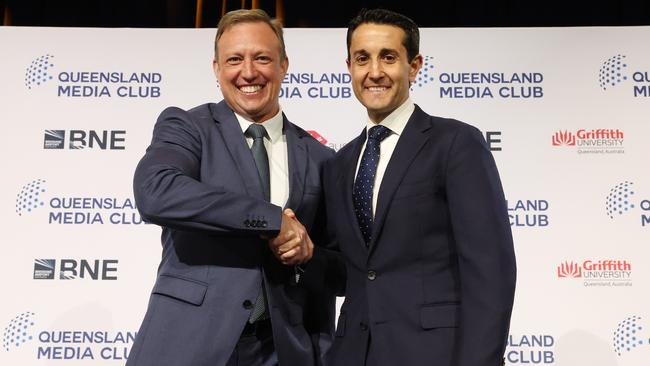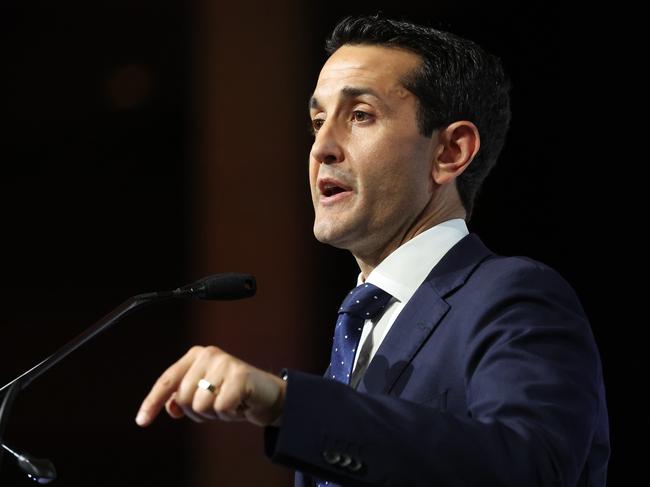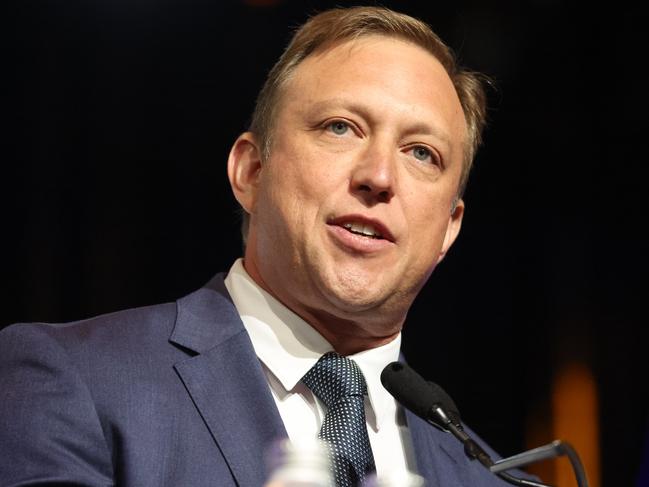Qld election campaign 2024: Blatant lies in campaign ads could be scrapped by 2028 under LNP
David Crisafulli’s “entire campaign is based on a series of lies”, Premier Steven Miles says, as he targets the Opposition Leader’s commitment to implement truth in political advertising laws.

QLD News
Don't miss out on the headlines from QLD News. Followed categories will be added to My News.
Premier Steven Miles has unleashed on his opponent David Crisafulli on day 18 of the election campaign, calling him a “very deceitful person” running a campaign based on lies.
Mr Miles, asked whether he would match Mr Crisafulli’s commitment to implement truth in political advertising laws for the 2028 election, said he would consider the laws before unloading on the LNP leader.
EVERY LIE TOLD THIS CAMPAIGN FACT-CHECKED HERE
“His entire campaign is based on a series of lies,” he said.
“He’s a very deceitful person who thinks that they can get through this campaign without providing an honest answer about women’s rights, about costings, about cuts to healthcare, about stadiums, about coal royalties, about anything.”
Mr Crisafulli returned serve, with a voew to remind Queenslanders of all the “vitriol” and false claims peddled by Labor throughout the election in four years time.
Mr Crisafulli, campaigning on the Sunshine Coast with members of his frontbench including Deputy Leader Jarrod Bleijie, went on the offensive.
“If we are given the privilege of governing, I intend to come back in four years time, and I am going to print out all of the vitriol that I’ve seen on social media, all of the false claims, and I am going to remind Queenslanders of what the Labor Party has said time and time again,” Mr Crisafulli said.
“And it will be the final little bit of shred of credibility.
“Queenslanders don’t believe the Labor Party anymore because they’ve heard all these scare campaigns.”
Mr Miles reaffirmed he would look at the South Australian model for truth in political advertising laws.
Under Mr Crisafulli’s pledge, blatant lies in election material would be a thing of the past in Queensland by 2028, as he confirmed he would be open to considering such laws as long as they did not curtail democracy.
But Premier Steven Miles remained unrepentant amid ongoing scare campaigns spruiked by Labor-linked third parties, including his own United Workers’ Union, and ultimately did not make a firm commitment to consider truth in political advertising laws.
Scare campaigns and misleading claims have dogged both major parties throughout the 2024 election race, ranging from baseless claims of the LNP privatising hospitals to misleading flyers of Labor implementing a so-called patients tax.
And the Electoral Commission of Queensland is powerless to act, with existing laws only making it unlawful to mislead and cause someone to cast an informal vote or making a false statement about a person’s character or conduct.
Experts say truth in political advertising laws would make elections in Queensland more civil. Similar rules have been successfully in place in South Australia for 40 years, with the Australian Capital Territory recently putting in place its own framework.
They say it is also possible to strike a balance between stamping out lies in election material and allowing political speech to run freely.
Mr Crisafulli, campaigning in Townsville on Thursday, confirmed he would look at making it unlawful to lie in political advertising, declaring: “Heaven knows we need it.”
But he was also adamant any new laws must have a framework that did not curtail democracy.
“I’d very happily have a look at any model that comes forward,” he said. “In the interim my commitment is for a fully funded Parliamentary Budget Office, and that’s important for democracy.”

Mr Crisafulli also said there was merit in adding truth-in-political-advertising rules into Queensland’s electoral laws while an LNP government was tinkering with the act to overturn property developer donation bans and bring back optional preferential voting.
Mr Miles, when asked if he would implement truth in political advertising laws to stop false election material from being published in the 2028 election, argued there was nothing false about Labor’s current campaign material.
“We stand by it because we know that the LNP would cut, and if they won’t cut, they should be able to outline their costings,” he said. “They can’t outline their costings because they will cut, and you cannot achieve those kind of savings without cutting in health, and Queenslanders have a right to know that.”
He then claimed he hadn’t seen a “workable proposal” for such laws, despite South Australia’s 40 year legacy.
Mr Miles then said he would be “happy to look at what happens in South Australia”.
In South Australia political advertising cannot contain a “statement purporting to be a statement of fact that is inaccurate and misleading to a material extent”.

Complaints can be taken to the Electoral Commission, as an independent overseer, which considers both sides of the argument before requesting a withdrawal of the material or a retraction.
Australia Institute democracy and accountability program director Bill Browne said fines were possible, but in practice the commission’s decision was usually respected.
“South Australia’s truth in political advertising laws have been effective in nipping misleading advertising campaigns in the bud and providing a remedy for people who have been wronged by false ads,” he said. “The broader effect is to encourage a culture of honesty, which goes beyond the strict limits of the laws. There is no right to tell lies. The … laws have been found to be compatible with Australia’s constitutional protections for freedom of political communication.”
University of South Australia communications and media lecturer Cameron McTernan said the laws in his state promoted a healthy campaign culture that was “mostly respectful”.
“The other benefit of the law is that it is fairly modest. If the electoral commissioner deems an ad to be untruthful it must be taken down with a retraction statement. They might get a small fine too,” he said.
Misleading or baseless claims used in election material have come from unions such as the UWU which has distributed pamphlets across 10 electorates falsely claiming the LNP would sell off a health asset in the area.
The LNP has also been claiming Labor will implement a “patients tax” that would cripple GP clinics.
WE FACT-CHECK THE PARTIES
Originally published as Qld election campaign 2024: Blatant lies in campaign ads could be scrapped by 2028 under LNP


